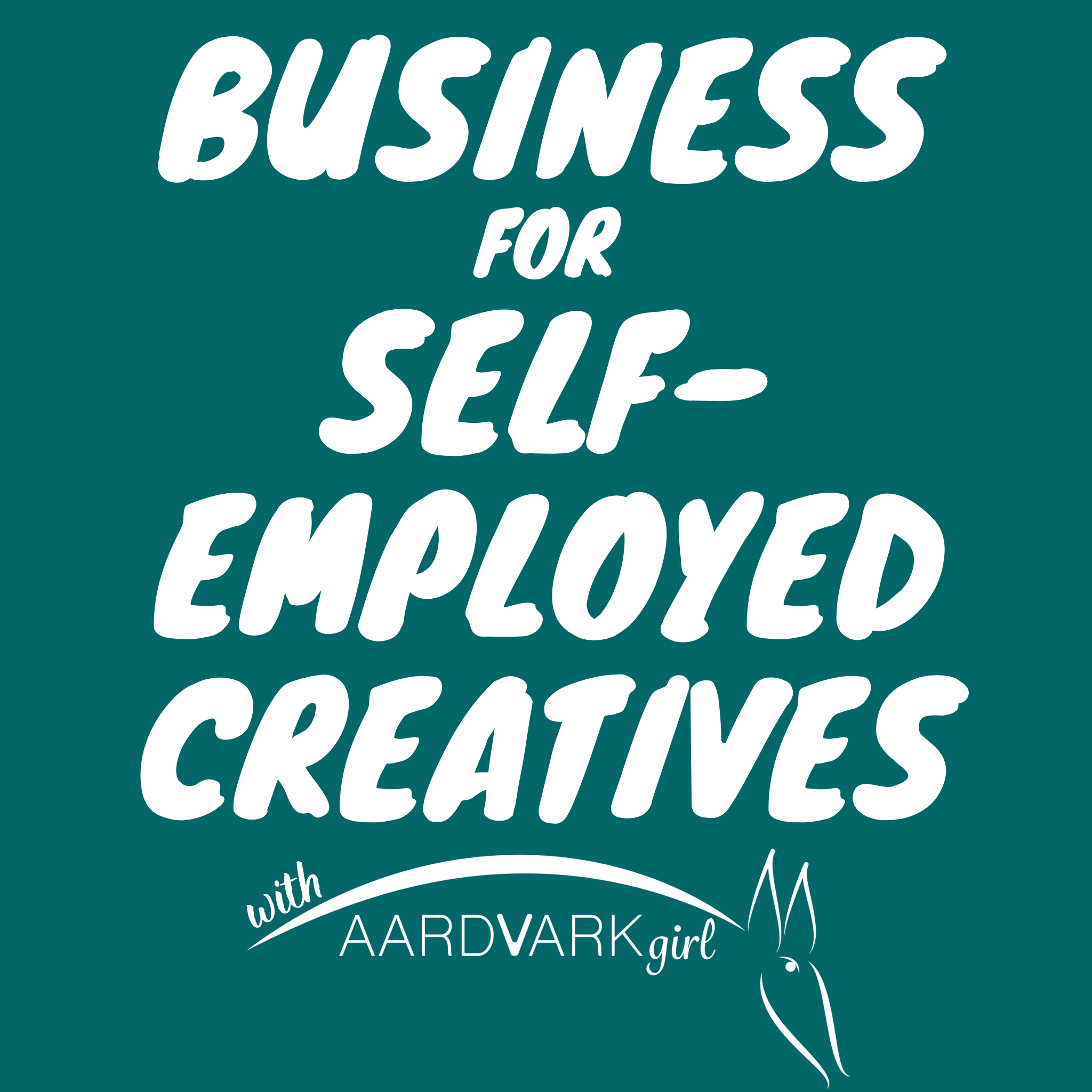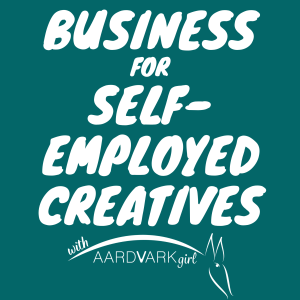
Helping business owners, freelancers & other self-employed creatives succeed… and have fun doing it. It can be overwhelming at times, but there’s nothing like the privilege of working for yourself – making your own rules, owning your time, and trusting your instincts to make the right decisions. With short episodes that get straight to the point, this podcast is about the common issues we face in business, along with solutions that work for other creatives like you. Aardvark Girl is a producer, project manager & business specialist with 20+ years of experience managing companies & helping people in creative industries. She helps you get a handle on the business side of things so you can focus on your talent. Let's get to work!
Episodes

Monday May 24, 2021
John Masse: Seagulls & Sandwiches
Monday May 24, 2021
Monday May 24, 2021
John Masse is the perfect example of a self-employed creative. He’s had a lucrative career as an illustrator, animator, creative director, scenic designer, and more. His creations have been seen all over the world, and while he loves what he does, he also prioritizes his family.
In this episode, we discuss what it takes to run a creative business - managing your time and money, avoiding procrastination, knowing when to call it a day, and more. He can trace every step of his career back to his first job designing t-shirts in a shop in Vegas. That experience started the path that eventually led to working with Sting in Belgium and meeting George Lucas to develop a Star Wars apparel line for Skechers.
John explains his "Seagulls and Sandwiches" concept and the abundance mindset - there is plenty of work out there if you find your empty spot on the sand. He also talks about the importance of selling who you are before what you do, relying on your network, and knowing how much you need to make each month so you can successfully steer your own ship.
Connect with John @massecreative
Connect with me on your favorite platform: https://pods.link/aardvarkgirl
--
00:38 I had enough of an education and an experience in things I was interested in, to figure out rather quickly that I could make a living from the things that I was good at.
01:52 My career can be traced sort of in a linear progression. So one job, or one account, or one relationship, always begets the next thing.
02:52 I like the idea that when you're your own boss, and when you're a hyphenate, every day is different. Every day is unique.
05:23 I love being a dad. So I want to capture those little teeny moments, and I also can compartmentalize my life. And that's the biggest trick for being a self-employed creative is that you have to know your hours. You have to know your time. There has to be a familial understanding. And I know, for sure, from years of experience, you work way more than 40 hours when you work for yourself. So you have to be able to call it a day. And that is a discipline, especially if you are geared towards steering your own ship for the rest of your life.
09:44 I don't panic on the slow days. I know my nut. And that's just slang for knowing what the house costs, what the Target bill is going to be, what all these pay subscriptions are going to run up, what my health insurance costs. I know what I need to make every month, and everybody should know that. You should always, always know that. And that's your baseline. From there, I can handle my billing, I can handle my goals, my wants, my needs, my desires. I know how to sell myself. I know how to keep the ship running.
The creativity comes so freely to so many of us that we suffer from imposter syndrome, that we're like, I shouldn't be getting paid for this. It doesn't cost me anything to draw. I can draw anything in a second. I can think up of a name and a story. I could write a book. Why would I get paid for that? Is that worth anything to anybody? And they're having these existential crises in their own head and I'm like, think about business. Business first. What are you doing? Pay attention to those things.
13:14 I think it's important to be liked before you can sell anybody anything. There is that balance of being liked before you can bill for it, but know when to bill for it.
16:11 This is a necessary thing that we do, and therefore we have created purpose and meaning to our lives in doing something creative, and being entrepreneurs, and being our own bosses. So there's a joy in it. I always go with an open mind because I'm going to learn something with every business account that I have, or every little venture that I have. And then that's fun. And I always finish off with “I can't wait for the next one!"
20:37 There are better artists. There are funnier people. There are taller people. There are younger people. There are people that are all charisma. There are people that are just perfectionists at what they do. But you have to carve out that little piece of your talent, and your skill, and whatever you bring to the creative world.
25:36 All the funny things that I did, all the experimental things that I did, all the goofy things have worked their way into this creative life of mine collectively, but it's because I picked one thing that I was very good at.
27:18 Seagulls and sandwiches goes with that concept of abundance, which is there's so much work out there. We're always like, you know, fighting for a job, or panicking, or nervous for a job. And it's like, no, no, the work is there. You've got to find the spot on the beach where there are no seagulls because the sandwiches are there. Some of them are under the sand. Some of them are everywhere, but you're going to find the place. And the trick is to look for a void. Look for a specialty. Look for something that you do that no one else does.
28:53 When you're in that creative world, you want to find that specialty. Start there. Start with that one thing that you're better at than anyone else is that gives you the most passion and that is your starting spot. That's your place in the beach where you can sit down, relax, and have a sandwich and no one's competing with you. I call it a void.
I created Muffalo Potato because I remember how amazing Mr. Rogers was when I was a kid. And I remember Captain Kangaroo. And I remember step-by-step drawing shows that I saw as a little, little kid, which I thought were fascinating. And I didn't see that anywhere in the market. I didn't see it anywhere in the world. And I was like, you know, since Mr. Rogers passed, there's no one else that's sort of taken his mantle as, you know, talking to kids. And I can't teach morality because I'm an amoral person at best, but I can teach kids how to draw, you know? And tell them that, look, it doesn't have to be perfect. It just needs to be fun. And I looked and I realized there's a void. There's a little spot in the YouTuber/influencer/social media world where nobody is teaching kids how to draw, and certainly not in the kind of weird way that I could figure it out. And that's been a wild success.
36:55 Know your strengths and know how much time you could dedicate to your curiosity. And because creative fields tend to serve as adjuncts to other creative fields... for example, I started in apparel design, which involves drawing, which involves copy and typeface. So it was very easy for me to get into advertising from there. Because I was good at drawing, I could get into storyboards. Because I was good at setting up storyboards, I could get into scenic, right? So now I've got scenic and design, then that gets theatrical. But I'm also drawing, and so I can get cartoony, so I can create characters, right? But because I am a character, I could come up with an imaginative story of how that character came to be. And now I'm a writer. So the flow-through almost occurs, it almost incurs invisibly. It's in the background.
The only thing, the only requirement, is that you have to succeed. There's no “I'm not going to try it.” Just do it. You can't fail at anything. Don't approach it like you're going to fail.
It's about completion. It's about finishing what you start. There's no room for procrastination in this world, especially because you do want bigger projects, you know? It's nice to have a day rate. It's nice to have four days’ worth of work. It's nice to have two days’ worth of work. It's really good to permalance, or to be, you know, as soon as this project is finished, they call you right for the next one. And that's where you build that security, and that experience, and you really get some momentum behind you.
47:37 Star Wars is what changed my life when I was seven years old. The movie came out, and I saw it, and it flipped me out. And I was upset over the years that, oh, they were making the prequels and now they're making the sequels. And I thought at this point, I would have been one of those storyboard artists that would have sat on George Lucas's lap and drawn. “Is it good, daddy? Is that?” You know, I thought that was gonna happen. But lo and behold, Skechers got the Star Wars account. And the entire company said, “Alright, John. You're heading to Lucasfilm in San Francisco, and you're going to talk to him about the new movie, 'The Force Awakens,' and you're going to build the apparel line.” And there it was. It was that arc that happened.
There is the starting point. There is the through line, the mistakes, everything that's happened. The connection is there. I have zero regrets. If I did one thing differently, at a split second, just a different flap of the butterfly's wings, I'd have a completely different life than I have right now.
52:09 It goes back to who you are, because people like to work with you first, and then what you do second, right? And they're like, “Well, you sold me on the idea. Let's give it a shot.” The most amazing thing that you're going to do is the next thing. Always remember that. That's the way I feel, you know? What's the best thing you ever did, John? The next thing. The next thing is the best thing I ever did. But really, it's the kids. It's the two kids.
53:46 You've got to sell yourself first. Remember that. Not what you do, but who you are. You've got to lean on your clan. You have to know your nut. You have to know what you need to make. If you build it, and you break it, you can rebuild it again. So don't be afraid of stuff blowing up in your face, because you got there in the first place. Every little success is proof of concept. So take that, add value to everything you do, and earn a life away from your work. That's all you need to do.

No comments yet. Be the first to say something!